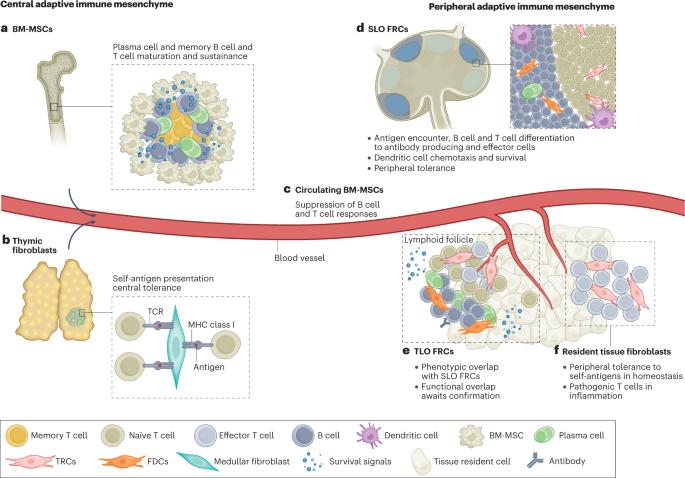The advent of immune stimulating CAFs in cancer
IF 66.8
1区 医学
Q1 ONCOLOGY
引用次数: 9
Abstract
The theory that cancer-associated fibroblasts (CAFs) are immunosuppressive cells has prevailed throughout the past decade. However, recent high-throughput, high-resolution mesenchyme-directed single-cell studies have harnessed computational advances to functionally characterize cell states, highlighting the existence of immunostimulatory CAFs. Our group and others have uncovered and experimentally substantiated key functions of cancer antigen-presenting CAFs in T cell immunity, both in vitro and in vivo, refuting the conventional assumption that CAFs impede adaptive immune rejection of tumours. In this Perspective, I unify the follicular and non-follicular, non-endothelial stroma of tumours under the ‘peripheral adaptive immune mesenchyme’ framework and position subsets of CAFs as direct positive regulators of the adaptive immune system. Building on the understanding of cancer antigen presentation by CAFs and the second touch hypothesis, which postulates that full T cell polarization requires interaction with antigen-presenting cells in the non-lymphoid tissue where the antigen resides, I re-design the ‘cancer-immunity cycle’ to incorporate intratumoural activation of cancer-specific CD4+ T cells. Lastly, a road map to therapeutic harnessing of immunostimulatory CAF states is proposed. In this Perspective, Tsoumakidou explores the emerging role of cancer-associated fibroblasts as positive regulators of the adaptive immune system in cancer.

癌症免疫刺激 CAF 的出现
癌症相关成纤维细胞(CAFs)是免疫抑制细胞的理论在过去十年间一直盛行。然而,最近的高通量、高分辨率间充质定向单细胞研究利用计算技术的进步从功能上描述了细胞状态,凸显了免疫刺激成纤维细胞的存在。我们的研究小组和其他研究小组发现并通过实验证实了癌症抗原递呈CAFs在体外和体内T细胞免疫中的关键功能,驳斥了CAFs阻碍肿瘤适应性免疫排斥的传统假设。在本《视角》中,我将肿瘤的滤泡和非滤泡、非内皮基质统一在 "外周适应性免疫间质 "框架下,并将CAFs亚群定位为适应性免疫系统的直接积极调节因子。基于对 CAFs 呈递癌症抗原的理解和第二次接触假说(该假说认为 T 细胞的完全极化需要与抗原所在的非淋巴组织中的抗原呈递细胞相互作用),我重新设计了 "癌症-免疫循环",将癌症特异性 CD4+ T 细胞的瘤内激活纳入其中。最后,我提出了利用免疫刺激CAF状态进行治疗的路线图。在这篇 "视角 "中,Tsoumakidou探讨了癌症相关成纤维细胞作为癌症中适应性免疫系统的积极调节者所扮演的新角色。
本文章由计算机程序翻译,如有差异,请以英文原文为准。
求助全文
约1分钟内获得全文
求助全文
来源期刊

Nature Reviews Cancer
医学-肿瘤学
CiteScore
111.90
自引率
0.40%
发文量
97
审稿时长
6-12 weeks
期刊介绍:
Nature Reviews Cancer, a part of the Nature Reviews portfolio of journals, aims to be the premier source of reviews and commentaries for the scientific communities it serves. The correct abbreviation for abstracting and indexing purposes is Nat. Rev. Cancer. The international standard serial numbers (ISSN) for Nature Reviews Cancer are 1474-175X (print) and 1474-1768 (online). Unlike other journals, Nature Reviews Cancer does not have an external editorial board. Instead, all editorial decisions are made by a team of full-time professional editors who are PhD-level scientists. The journal publishes Research Highlights, Comments, Reviews, and Perspectives relevant to cancer researchers, ensuring that the articles reach the widest possible audience due to their broad scope.
 求助内容:
求助内容: 应助结果提醒方式:
应助结果提醒方式:


